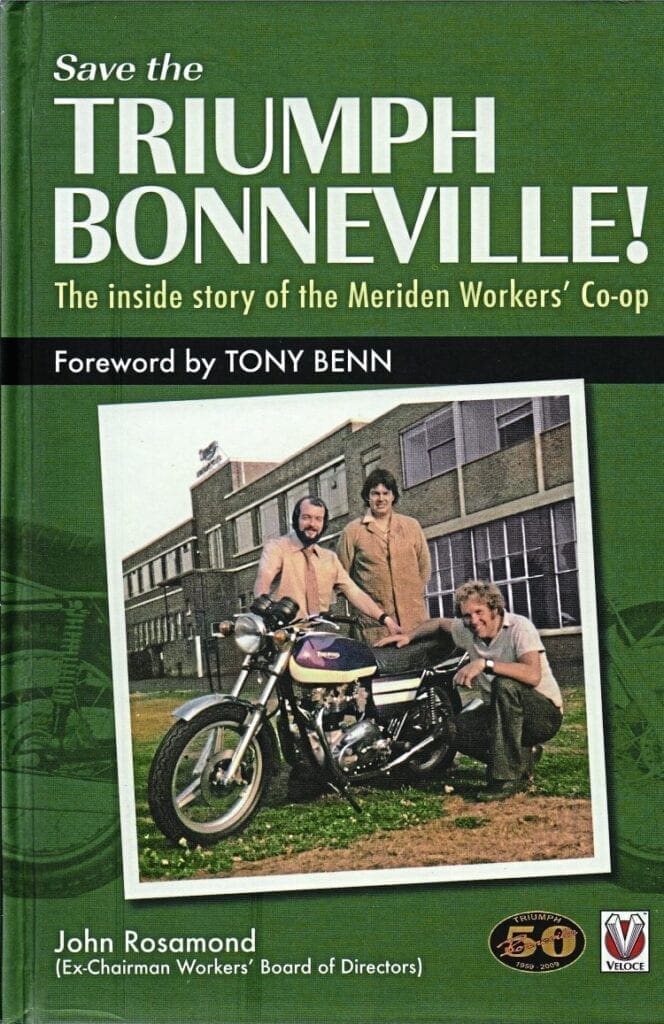Recently there’s been plenty of opportunities to catch up on your reading. I’ve been given a large collection of copies of The Motor Cycle, 1956-59, that I’ve been devouring, while my shelves already groaned with reference volumes and other tomes found at shows and jumbles. Books by Roy Bacon and Bob Currie are regularly perused, as are Rupert Ratio’s books on BSA Unit Singles.
Then there are books that have less in the way of technical information but tell a fascinating tale – the story of the steady rise and rapid fall of the British motorcycle industry – Oli
Save The Triumph Bonneville – The Inside Story of the Meriden Workers’ Co-op
THIS BOOK DOES a decent job of telling the Meriden Co-op’s story from the point of view of the factory workers. Rosamund was a welder when he joined the company in 1970 at the age of 25, became spokesman for the welders, and in 1977 became chairman of the Co-op’s board of directors.
The book is a little hard work in parts but is as good an example of one man’s recollections as is available. The first chapters dealing with what went on during the sit-in and factory takeover are personal and fascinating. The Meriden Co-op successfully survived for a decade in the toughest of circumstances and deserves having its place in history recorded.
There’s quite a lot of information about some of the projects that Meriden came up with on a shoestring, including some rare pictures of various factory customs.
The Co-op’s efforts to tie-in with Moto-Guzzi get a look in. There are details of one bike I wasn’t aware of, a sadly stillborn effort using a modified T140 Bonneville frame with a bored out 900cc Triumph Trident engine in it to create an all-British superbike, which looks very fine.
There’s also some behind the scenes stuff about a deal that was very nearly signed between Triumph and Suzuki, where Triumph would build Suzuki models in the UK in a new factory.
There was also another mooted but ultimately unsuccessful deal with Armstrong, who were making bikes for the Army at the time.
The bikes from the last years – the sparkly Jubilee and royal wedding models, the challenging appearance of the TS8-1 are featured heavily. The desperate struggle to keep things going in the early 1980s is told with an inevitable tinge of sadness.

The book does suffer a little from the density of the information, with lots of detail about politics and finances and loan agreements gone bad, unpaid rates bills, and many behind the scenes machinations, which make some sections a tough read.
But if you are interested in the Meriden story as much the bikes, it’s a fascinating record of the times.
The story of what was one of the most successful British workers’ co-ops deserves its place in history, as without it Triumph as we know it know it now would never have existed.
Indeed, if you visit the People’s History Museum, in Manchester, which is an otherwise splendid place and tells the story of Trade Unions and that sort of stuff, you’ll find shelves of books and academic studies on the likes of the Upper Clyde Shipbuilders Work-In, which lasted a year, and not a single item about Meriden in the 1970s and 80s. They need a copy of this book.
■ Veloce Publishing. Out of print and available used from £18-30
■ Amazon Kindle ebook £8.99
■ ISBN: 975 1 845842 65 9
Read more Letters, Opinion, News and Features online at www.classicbikeguide.com and in the July 2020 issue of Classic Bike Guide – on sale now!




